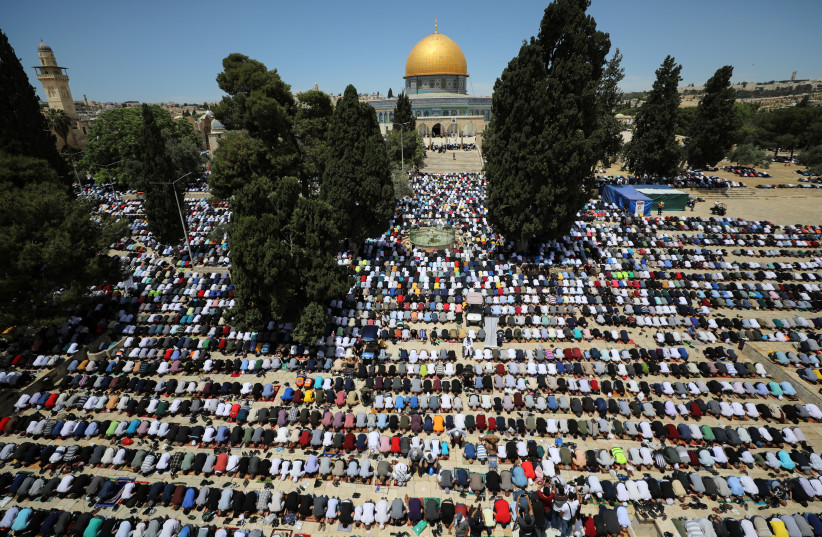Passover and Ramadan coincide this year. When you read those words in the media, they will often be followed by a statement along the lines that all efforts must be taken to reduce tensions and ensure calm during this time. Repeated often, these statements imply that when Passover and Ramadan coincide, it must mean that they collide. Let us get straight to the point and say: we do not believe these statements to be true.
This narrative espoused by some in the media creates a dangerous perception that Islam and Judaism – and perhaps even other religions – push or inspire their followers to commit acts that are violent in nature and beyond the pale. Even worse, this thinking cedes religion to those that wish to use it to cause harm, all the while willing tension into existence by creating a self-fulfilling prophecy: claiming that Ramadan and Passover coinciding increases tension could, in and of itself, increase tension.
Instead, the positioning of this concurrence should highlight the opportunity that it presents. Instead of propagating false narratives of religion-clashing, we should choose to see this occurrence for what it really is: the universe literally aligning to remind us of what unites us, as we worship, pray, and fast together.
During this holy period, observers of both religions are pushed outside of their comfort zones in an effort to elevate – not denigrate – themselves and one another. As a proud Jew and a proud Muslim, we genuinely believe that those of our coreligionists that observe Passover or Ramadan (in whatever way they choose) become more – not less – enlightened toward peaceful coexistence.
We can do so much better than merely tolerate each other. We have become so accustomed to hearing the word tolerate in the context of our peoples that we now just live with it. Tolerance should be reserved for the mundane, not for each other. We tolerate taxes, lines at football and soccer games and masks on planes.

We shouldn’t merely tolerate each other, we should love one another, because what unites us far transcends what divides us. Merely expecting that we tolerate one another is far too low a bar for what God has asked us to accomplish on this planet. We believe that the lessons of Passover and Ramadan will better equip all of us to reach that ideal.
So much good is already happening, all we must do is amplify it. This will be the second Ramadan and Passover since the signing of the Abraham Accords. In these two years not one there has been not one reported incident of antisemitism in the entire United Arab Emirates – not antisemitic and not anti-Israel. In fact, it is safer to walk the streets of Abu Dhabi and Dubai as outwardly identifiable Jews than it is in New York, London or Paris.
As Jews around the world say at their Seder, Dayenu, that would be enough of a reason to give praise to God, but we as God’s creations cannot be satisfied with the absence of hate. We cannot possibly discuss meaningful coexistence without raising the Abraham Accords, which have allowed Jews, Muslims, and Christians in the Middle East to relearn one another after decades of only coexisting by proximity and separated by ignorance.
Those of us who have interacted closely with Muslims, Jews, and Christians of the signatory countries can attest in no uncertain terms that the holidays celebrated by these three great religions do not cause hatred, tension or angst. Israeli Jews have been welcomed at iftars from DC to Dubai, and Muslims from the UAE have been welcomed in synagogues from Boca Raton to Jerusalem.
In fact, a great example that truly epitomizes the spirit of what we’re describing here is the Sheikh Zayed Grand Mosque in Abu Dhabi, UAE. The mosque, which welcomes visitors of all faiths all year long, runs various initiatives during the holy month of Ramadan that should serve as an antidote to the fallacy that we collide during the periods considered holy by our respective religions.
One such initiative is Iftar Sa’em, which literally translates to “feeding a fasting person,” a program that brings together more than 30,000 people daily, from all walks of life and various faiths, at the mosque to dine at one table.
Another initiative sponsored by the mosque during this holy month is inviting citizens and residents from various religions and backgrounds to spend a day of volunteering together that culminates in distributing iftar meals.
The beautiful experiences happening at the mosque are only a few of the many great examples taking place around the world every day between Muslims and Jews, because when left to our own devices, without the interference of those who want us to collide, we instinctively want to come together in peace.
So, the next time you see a headline that insinuates that Ramadan and Passover are at odds, rest assured that those who wrote it do not understand our religions, at best, and, at worst, they are rooting for those who have hijacked peaceful religions for extremist wins.
Wishing everyone celebrating a peaceful and joyous Ramadan and Passover.
Dr. Yousef Al Obaidly is director general, Sh. Zayed Grand Mosque.
Rabbi Aryeh Lightstone is former special envoy for economic normalization for the Abraham Accords.
